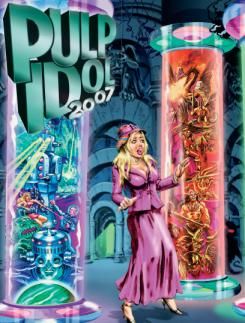In the latest issue of SFX, we've delivered more advice for this entering the Pulp Idol short story-writing competition. To help you on your way, our Jonathan Wright spoke with renowned author Gwyneth Jones.
SFX: Science fiction is at times portrayed as the fiction of ideas rather than character. If this is even true, to what extent do SF short stories work best if they have a big idea to propel them forward?
Gwyneth Jones: "Some science fiction stories are all about science, and the characters are just talking heads. It’s an ancient form, you could trace it back to Plato, you have the Chief Scientist (essentially) and the helpful voices who ask the right questions or make the right objections. Some science fiction stories are all about character, and there's no science at all, just some kind of Star Trek decor when the action is purely romance, or maybe a thriller. Ideally you want to strike a balance.
"But remember, when people call SF a 'fiction of ideas', that doesn’t mean you get away without working on the 'fiction' part. SF stories work best when the people in the story have a big idea to propel them forward, and that means you need convincing characters."
SFX: One of the stock joke SF novels is the one where an apocalypse leaves one man and one woman – Adam and Eve y'see? – to begin over. Are there any SF short story ideas/clichés that should be avoided? Conversely, I guess, are such areas potentially good ground for anyone who can find a new spin on an old idea?
GJ: "It's fashion. I'd be reluctant to say any idea for a story had been 'done to death', because there's always a new twist. Right now, I'm very tired of 'gritty future noir'. Ten or 15 years ago, it was impossible to take space opera seriously. Mars had a real vogue, maybe Mars got done to death?"
SFX: Are there any SF short story mistakes you made early on that you’d like to share?
GJ: "Not writing short stories. I kept writing stories that became too long, threw most of them out (or turned them into novels). I'm still not prolific, but I'm writing more short stories now than ever before. It's refreshing, not instant gratification, but better."
SFX: SF stories are frequently full of jargon and arcane terminology. How do you make this convincing?
GJ: "Do background reading. If possible, hang out with people who talk like that, and just change the terms a bit. But if you have a tin ear for neologisms, no one can help you..."
SFX: Is it any different creating SF characters as opposed to ‘here-and-now’ characters?
GJ: "Creating convincing aliens ties people in knots, but if anybody truly succeeded the story would be unreadable, so why worry? Just get as near to unreadable as you dare. Someone, can’t remember who, said all her aliens were really dogs and monkeys that she’d known. Or maybe that was Anne McCaffery and she said all the dragons are horses. Not that I’d ever have guessed."
Sign up to the SFX Newsletter
Get sneak previews, exclusive competitions and details of special events each month!
SFX: How much do you need to know about science to write science fiction?
GJ: "I've been reading the genre a long time, and I think the answer has to be, you don’t need to know anything."
SFX: Are there any particularly fruitful places to look for SF short story ideas? New Scientist? The pub at the end of the street? A pop science article on Mars?
GJ: "I read New Scientist. I pay attention to any kind of news. I try to have a life, I think that sums it up. I'd hate to be the kind of SF writer who takes root in front of the SCI FI Channel, knows all the great series, and just churns it all out again... no matter how lovingly."
SFX: If you had to give one piece of advice to someone setting out to write SF short stories, what would it be?
GJ: "Have a big project. One of the hardest things is to convey a whole world, confidently, in the compass of a short story. If you have a background project, for example, a 'world' or a 'human colonised space', with a big story you want to tell, maybe in a novel, you can draw on that, and you’ll seem more in control of your material."

For more advice on writing short SF stories, you might like to check out the current issue of SFX .
SFX Magazine is the world's number one sci-fi, fantasy, and horror magazine published by Future PLC. Established in 1995, SFX Magazine prides itself on writing for its fans, welcoming geeks, collectors, and aficionados into its readership for over 25 years. Covering films, TV shows, books, comics, games, merch, and more, SFX Magazine is published every month. If you love it, chances are we do too and you'll find it in SFX.












